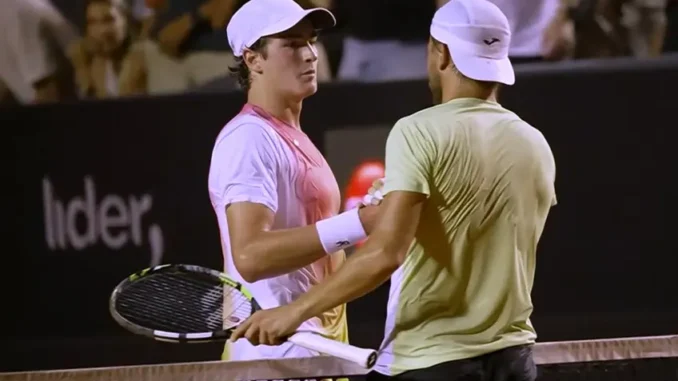
Alexandre Muller’s victory over hometown hero Joao Fonseca at the Rio Open was a moment that resonated far beyond the final point. It was a clash of generations, a battle between experience and youthful exuberance, played out under the intense scrutiny of a passionate crowd. Muller, the seasoned professional, weathered the storm, silencing the partisan support with a display of resilience and skill. Fonseca, the rising star, the pride of Brazil, fell short in his quest for glory on home soil.
The match itself was a rollercoaster of emotions. Muller, with his years of tour experience, came out firing, taking the first set with authority. His serve was a weapon, his groundstrokes found their mark, and his court craft kept Fonseca on the back foot. But the young Brazilian wasn’t going down without a fight. He battled back in the second set, raising his game to match Muller’s intensity. The crowd roared its approval, sensing a comeback. However, Muller held firm, displaying the mental fortitude that separates the best from the rest. He weathered the storm, and in the end, his experience proved to be the difference.
“I feel sorry for the tournament and for the fans,” Muller said after the match, acknowledging the disappointment of the local crowd. “Fonseca is a superstar here, but I wanted to win.” It was a sentiment that echoed the feelings of many who had witnessed the match. Muller had come to Rio de Janeiro to compete, to test himself against the best, and to emerge victorious. He had done just that, but not without a touch of regret for having dashed the hopes of a nation.
“Joao will win for many, many years,” Muller continued, praising his young opponent. “One day I will tell my children that I beat Joao Fonseca on the centre court in Rio de Janeiro. He will be a legend of the sport.”1 It was a magnanimous gesture, a recognition of the talent and potential of the young Brazilian. Fonseca, despite the defeat, had shown glimpses of his brilliance, and Muller, in his moment of triumph, acknowledged the bright future that lay ahead for his opponent.
The match was more than just a contest between two players; it was a symbol of the ever-evolving nature of sport. It was a reminder that experience and resilience can triumph over youthful exuberance, that even the most promising talents must earn their stripes. It was a lesson in humility, a reminder that even in victory, there is always respect for the opponent.
For Muller, the victory was a testament to his dedication and hard work. It was a validation of his belief in himself, a confirmation that he could compete with the best in the world. It was a moment to savor, a memory that he would cherish for years to come. “One day I will tell my children that I beat Joao Fonseca on the centre court in Rio de Janeiro,” he said, and in those words, one could sense the pride and satisfaction of a man who had achieved something special.
For Fonseca, the defeat was a setback, but not a failure. It was a learning experience, a chance to grow and improve. It was an opportunity to reflect on his game, to identify his weaknesses, and to come back stronger. “It’s about learning from these experiences to become stronger,” he said, displaying a maturity beyond his years. “I can only thank the affection of all the fans and the Brazilian people.”
The Rio Open is a tournament that showcases the best of tennis, and this year’s edition was no exception. The clash between Muller and Fonseca was a highlight, a match that will be remembered for its intensity, its drama, and its sportsmanship. It was a reminder that tennis is more than just a game; it is a test of character, a battle of wills, and a celebration of the human spirit.
Leave a Reply